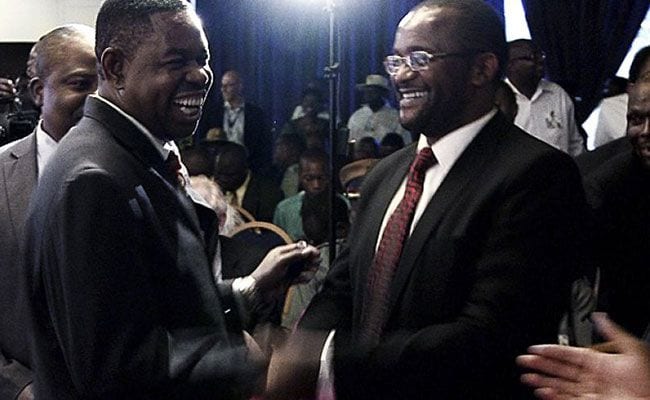
“What I’ve realized is that people don’t admire ruffians for leaders. People don’t admire bullying people.” Paul Mangwana and Douglas Mwonzora stand together in sunlight, as they speak, their faces suggesting a mix of exhaustion and relief. They’ve spent three years writing Zimbabwe’s first constitution, a process that began with thousands of meetings with citizens and ended with forging compromises.
The process was complicated at every step, primarily by Robert Mugabe, the notorious “ruffian” who has been president of Zimbabwe since 1987. Camilla Neilsson’s brilliant documentary Democrats follows the negotiations from their start, including a chilling speech by Mugabe following the 2008 election in which his party, ZANU-PF, lost control of Congress. “Democracies in Africa are a difficult proposition,” he says,” leaning over his microphone, “because always the opposition will want more than it deserves.” The crowd cheers because, well, the crowd always cheers for Mugabe, whose regime is renowned for arresting, torturing, raping, and killing all opponents — and perceived opponents.
The film offers up a minute or so of this history via archival footage, then launches directly into its focus, the work to be done by co-chairpersons of the parliamentary select committee COPAC, ZANU-PF representative Mangwana and Mwonzora negotiating for the opposition party, the Movement for Democratic Change (MDC), headed by the relatively liberal Morgan Tsvangirai. Their first assignments take them to rural areas, where they meet with locals to ask what they want to see written into the constitution. A first question is, how should judges be selected? Again and again, you see in a montage that’s at once horrifying and comic, people insist that only the president can choose judges.
Of course, there’s bullying afoot, acknowledged separately by both Mangwana and Mwonzora, specifically, that ZANU-PF has sent teams to each site beforehand in order to “teach the masses”. Nielsson’s own team has remarkable access to each step, as Mangwana instructs his field workers as to their “clever” mission regarding the people’s “free speech” and then Mwonzora huddles with his coworkers, noting the effect of such intimidation. The two men speak repeatedly to the camera, which follows them into meetings and in their cars, making their ways from one location to another, ruminating on the tasks before them.
Primarily, these involve performance, putting on good faces and making speeches in order to win points, one by one. “We are a nation of great pretenders,” observes Mwonzora during a brief respite, on a motel room bed. The show, he goes on, is “so subtle but so effective”, such that people might even believe that they are free, that they make choices. Still, the film reveals, the façade can’t help but break down in specific instances, as when Mwonzora himself is arrested at one point, charged with wrongdoings some five years before.
Everyone sees that the arrest is a tactic to slow the constitutional negotiations, and so allow Mugabe to call them off because they’re taking too long. Here Mangwana is assigned to smooth over the looming poor PR, and agrees to meet with journalist Peta Thornycroft. She asks about the regime’s general habit of making such detainment, that is, arresting people and then conducting investigations, a process managed by what she calls “incompetent” police, who throw their victims into a “disgusting lice-ridden hell hole prison.”
Not missing a beat, seated across from Thornycroft at a restaurant table, Mangwana puts on his best show, protesting that these incidents are mistakes, only emerging in the wake of police overwork and economic “sanctions”. Thornyycroft looks him in the eye and calls this rationale “bullshit”. Moreover, she adds, “I’ve been there myself, I know this firsthand.” He has no answer.
It’s a striking scene in a film full of them, primarily comprised of one to one encounters where people confront difficult questions and seek substantive answers. When, following some sensational headlines, Mwonzora is released “on bail,” he offers little in the way of outrage, except to describe his treatment (no food or water for three days) and the noteworthy discipline of his captors. Still, he says quietly, “We don’t have to say nice things if we are to remove him from power.”
As hard as the negotiations must be in a political environment where speaking truth to power is precisely not the tradition, and as opposite as their assignments appear to be, Mangwane and Mwonzora nevertheless pursue the objective of writing a constitution. That the sticking point ends up being a clause that limits a president’s term to a certain number of years is at once predictable, mundane, and surreal. Mangwane insists he must seek “political instructions” before he can proceed, leaving the room while the camera watches him recede from sight.
That he comes back to the process is testament to commitment by both men, and also, the film suggests, the pretense that must be sustained. That the show has effects, some lasting and admirable, some fleeting and raucous, makes it a lot like any other democracy.

